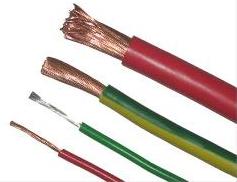Categories: Novice electricians, Electrician at home
Number of views: 171,463
Comments on the article: 4
Single and stranded wires. Application area. Advantages and disadvantages
 Many people, at present, very often have a question about why multicore and single-core wires are needed and for what purpose is this or that type used? I will try to give a clear, clear answer to this question. To do this, we will simply consider the following items separately: the structure (structure) of the multicore and single-core wires, the scope and main advantages of each type of conductor.
Many people, at present, very often have a question about why multicore and single-core wires are needed and for what purpose is this or that type used? I will try to give a clear, clear answer to this question. To do this, we will simply consider the following items separately: the structure (structure) of the multicore and single-core wires, the scope and main advantages of each type of conductor.
Wire structure
Single wire - this is a wire in which the cross section is formed by one conductor (current lead, residential). Stranded wire - this is a wire whose cross section is formed by several, sometimes intertwined, veins. Also, to give the wire more flexibility and elasticity, a thread can be woven with veins (it resembles kapron thread in strength and composition).
Scope of wires
Single-core wires are most often used in stationary wiring, for example: in residential buildings and apartments, for supplying electricity to outlets, to lighting lamps and so on.
In industry, thick single-core conductors can also be used to divert electricity generated by electric generators to the mains.
Stranded conductors are used mainly where increased flexibility, elasticity, vibration resistance is required from them, for example: in headphones, in extension tees, in car wiring, in household appliances and so on.
Advantages and disadvantages of single and multi-core wires
Advantages of single core wires:
-
Perhaps they are somewhat convenient in conducting wiring in the apartment. Sometimes they do not require special terminals for their connection, just twist their ends with forceps and wrap them with insulating tape, and the connection is ready.
-
They have the greatest stiffness in comparison with stranded wires (in some devices stiffness is sometimes required).
-
Basically, only single-core wires can be used in circuits that operate at high frequencies.
Advantages of stranded wires:
-
As mentioned above, they are flexible, flexible, and this explains their widespread use in various equipment and technology.
-
When using special terminals, their connection becomes more reliable and has less current resistance compared to a single-core conductor.
Disadvantages of a single-core wire: It does not tolerate repeated excesses, strong vibrations - these are perhaps one of the significant disadvantages.
disadvantages stranded wires: In high frequency circuits, their use is limited.
Read also on this topic:Which wires and cables are best used in home wiring
See also at e.imadeself.com
:
